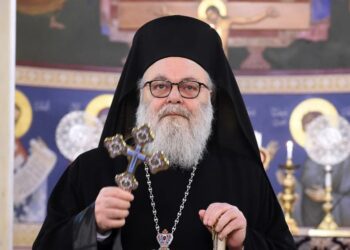The Greek Orthodox Patriarchate of Antioch and all the East published the Patriarch John’s message for the 2020 Holy and Great Lent.
As the Patriarch points out, God is satisfied with the one who works to achieve self-purification, taming oneself to become bright and clean.
In his message, the Patriarch says that fasting is forgiveness and forgiveness is a kind of renunciation, and thus it is giving to those whom God has not endowed with earthly money.
Patriarch John prayed for “the kidnapped, including our two brothers John Ibrahim and Paul Yazji, the Archbishops of Aleppo, who have been kidnapped since April 2013, under a deep and dubious international silence that grieves our souls and leaves us as indignant as towards the horrid kidnapping itself.”
Read the full message by Patriarch John of Antioch and All the East for Holy and Great Lent 2020
Beloved spiritual Brethren and Children,
At the beginning of Great Lent, it is a good thing to reflect on how the Church leads the ascent of the soul to the threshold of the Holy Resurrection. In this procession that we have joined, the soul accompanies Christ to reach His resurrection and her own resurrection, with Christ and through Him. The Holy Church established Great Lent to say that a person is their own master as long as they lean on God. The Church established Lent to say that the defilement of the soul must be washed before entering the threshold of Resurrection. She established it to say that God is satisfied with the one who works to achieve self-purification, taming oneself to become bright and clean.
Fasting is charity, mercy, and feeling with the other. Above all, it is continuous giving. It is not just deprivation from food, but rather a symbol through which we say to our Creator God that we deprive ourselves to feed the poor who is beloved to You. Fasting is giving, yielding and renunciation. Perhaps all its aspects are summed up in this point.
Fasting is forgiveness and forgiveness is a kind of renunciation, and thus it is giving to those whom God has not endowed with earthly money. Fasting is letting go of the anger in the soul and forgiving “those who trespassed against us” until the light of Christ irradiates in us so that we illuminate everyone else. The Holy Fathers have a saying that means: Let us not let the sun of this world set on our wrath, lest our soul be abandoned by the Sun of Justice and Righteousness, i.e., Christ to Him be the glory.
Fasting is a path by which we cleanse the depth of the soul with the balm of Christ. Fasting is a baptism by which we wash self-resentment in the font of repentance. Fasting is a Passover (Pascha), a transition from the routine of life to the spring of the souls. Fasting is a soul that falls on the knees in the Golgotha of Christ to rise with Him again.
Fasting is the nourishment of the soul that draws from its mortification the flood of life in the Lord; it senses in its strife and ascetic struggle the triumph of the Victorious Lord.
As Christians of the Levant, we have inherited this practice since the dawn of Christianity. At a young age, we have learned how to associate our temporal life with our eternal life. We have learned, especially during this period of Lent, how our ringing bells knock at the door of our heart to worship the “Lord of Hosts”. We were acquainted with these bells calling upon us up to gather in one voice around the Virgin in the Akathist Hymn.
Our bells and churches these days invite us to blossom with the spring of nature into the spring of a relationship with the loving Creator. They call us to shake off from the soul every obstacle to our entry into the nuptial room of Christ, the Bridegroom of the soul, to light the lamp of the souls like the wise virgins by vigilance, wisdom, love, longing, and discernment amid this world. They shake us to stand watching the richness of a love that has not relented from walking the path of suffering and the cross for the sake of humankind. In the end, they urge us to seek the dawn of the Resurrection of Jesus and to spread on his empty tomb wreaths of triumph and laurel leaves, in commemoration of his victory over death and the glad tidings of his glorious resurrection.We raise our prayers for the peace of the whole world and for this wounded Levant, which is in travail from pain of its countries and its people from all walks of life. We raise our prayers so that the roaring of wars melts away before the cheering of peace. We extend our prayers for every beloved person ripped away from us by the cruelty of our days. We also pray for all those who departed in the hope of resurrection and eternal life. We pray for God to keep a watchful eye on our homelands, and to be protected from all takfirism, terrorism, kidnapping, violence, and distress.
We raise our prayers for the kidnapped, including our two brothers John Ibrahim and Paul Yazji, the Archbishops of Aleppo, who have been kidnapped since April 2013, under a deep and dubious international silence that grieves our souls and leaves us as indignant as towards the horrid kidnapping itself.
We ask you forgiveness, my brothers and beloved ones, in these blessed days and may the Almighty Lord, who fasted first to guide us on this path, pour his everlasting mercies in all of your hearts, granting us the abundance of His divine blessings and “anointing” our whole lives by His holy presence, for He is blessed forever Amen.
From our Patriarchate in Damascus
February 23, 2020















